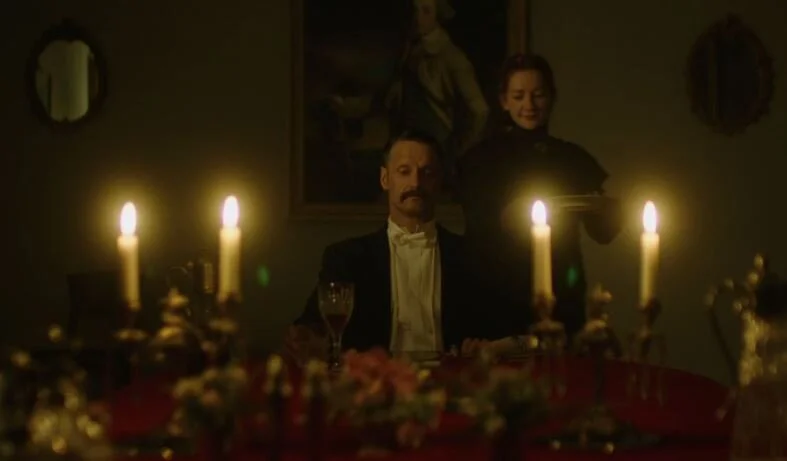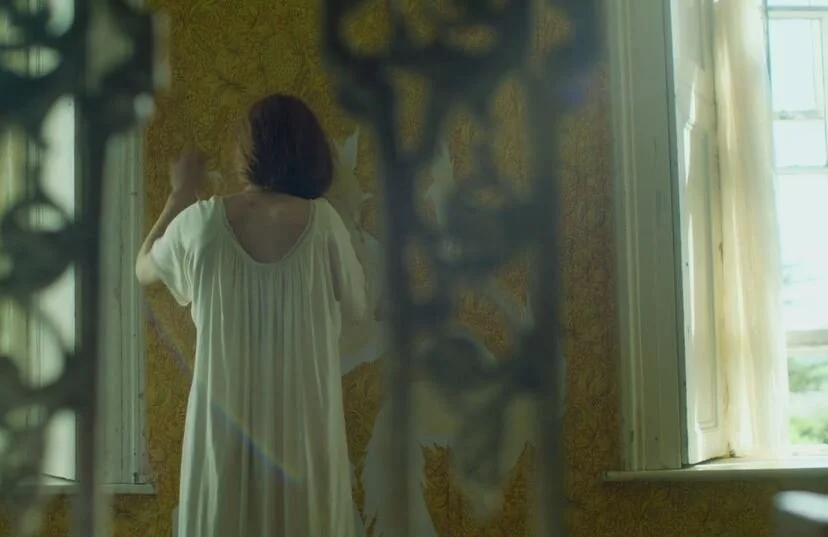The Yellow Wallpaper
When I first encountered The Yellow Wallpaper, I was an undergraduate at Boston University. I distinctly remember my freshman year American literature professor being dismayed at how few of us had read the book in high school. The same professor would go on to be dismayed at how few people in the class managed to get it read in time for class discussion too. I imagine teaching freshman must lead to a pretty consistent level of disappointment.
At the time there wasn’t a film adaption for students to watch in lieu of doing the reading. There was a masterpiece theater version, but the internet was in its infancy at the time, and streaming sites were still a pipe dream. At the time I wasn’t particularly surprised at the lack of a film. The story, published originally in 1892 and written by Charlotte Perkins Gilman, at first glance doesn’t seem to lend itself to film.
The Novella
The story in very basic terms is one about Jane, a young wife and mother, who along with her husband and child go to live for a summer in an estate, along with a nanny for her child. Jane suffers from what’s called ‘depression’ and ‘hysterics’. Her husband, John, is a doctor and believes that what Jane needs is the ‘rest cure’ which is bed rest and removal of any stimulation such as reading, writing, or taking an active hand in raising their child. As the summer progresses Jane is slowly driven insane by the isolation and boredom. She begins to fixate on the ugly yellow wallpaper in the room of her confinement, eventually coming to believe that there is a woman living in it.
It’s no small task to attempt to bring the story to life, but the team behind the 2021 film adaption has done a remarkable job in doing just that. The screenplay was co-written by Alexandra Loreth, who stars as Jane and co-produced, and Kevin Pontuti, who directed and co-produced. Joe Mullins plays the husband John, Jeanne O'Connor plays Jennie, Clara plays Mary, and Mark P. O’Connor who plays James rounds out the small cast.
The first thing you notice when watching the film is simply how good it looks. Cinematographer Sonja Tsypin does a wonderful job in giving the movie a distinct and captivating look. It’s a visually appealing film despite the need for ugly and washed out colors to be contrasted against brighter and more vibrant visuals. In a film where so much of what is truly happening is internal, making the external help tell the story can be tough to do and it is well done here.
The second thing that really grabs you is the unnerving score and sound. The discordant droning of the music and the often uncomfortable sounds that play against the long silences in Jane’s life do a compelling job of helping the viewer experience what she is experiencing. There is a scene a third of the way into the film where Jane is outside and hears the sound of mice (maybe a vole or a shrew, I can never tell the difference) and it leads her to an unpleasant discovery and eventually a breakdown. It’s a disturbing and genuinely hard to watch scene, but what stands out so much is how the sound of the animals and the music play against the bright blue sky, the greenery, and the beautiful birdsong, to create a chaotic moment where the pure trauma of Jane’s existence begins to come to light. It’s the kind of moment that sticks with you after the film and skitters around in your thoughts for a while.
The film has a number of scenes where the outward stillness and beauty of the estate and the grounds are placed in direct opposition to the increasingly seething chaos of Jane’s mind as she endures the crushing boredom of an existence where all her stimulus has been stripped from her. It’s a marvel that this is Alexandra Loreth’s first feature film because she is something of a revelation in a tough role. She holds the whole film together as her appearance, physicality, and speaking patterns become increasingly fraught. She is practically vibrating by the end of the film, filled with rage, grief, and mania born of having no outlet for what’s inside.
The story was originally written as a critique of the popular ‘rest cure’ that the author was put through. It also contains themes centered on postpartum depression and the near complete lack of agency in women’s lives and specifically within the field of medicine. Jane is totally at the mercy of her husband, the generally loving Joe. His abuse doesn’t manifest in physical violence or verbal abuse, but in his total disregard for her as a full human being. He dismisses her concerns and all but treats her like a child with no agency. Joe Mullins does a good job in playing this dismissal with an air of love that makes the trap Jane is in all the more insidious.
As the film rolls towards it’s manic conclusion, it gradually morphs from what feels like a period piece into a full psychological horror movie. It never slides into the supernatural although it makes some vague overtures in that direction. It reminded me a little of the first season of True Detective in the line it walks without ever crossing. That’s never an easy trick for a horror movie but it feels organic here and doesn’t leave you wanting it to commit more to either direction.
The film is not without flaws. It’s pacing is a bit uneven at times and some of the long still shots could be trimmed a bit, but really these are minor quibbles that didn’t get in the way of enjoying the film.
Overall the Yellow Wallpaper is the opposite of the titular wall covering. There is nothing sickly, dull, or unpleasant about this adaptation. The film hits on all the major themes of the book in ways that show the hardships women endured at the time of it’s writing, while also conveying that many of these issues are sadly timeless and just as relevant today as they were at the end of the 19th century. The horror genre is still dominated by zombies, vampires, ghosts, and other monsters, so it’s always a welcome surprise when something comes along that can make your skin crawl without the easy crutches of jump scares and gore. The Yellow Wallpaper is exactly that kind of movie. It’s not an easy watch, but it’s a film that will stay with the viewer long after they’ve turned the lights out and tried to go to sleep. Loreth and Pontuti are a team of filmmakers who will definitely stay on our radar for a long time.
At A Glance:
Director: Kevin Pontuti
Screenplay: Kevin Pontuti and Alexandra Loreth
Starring: Alexandra Loreth, Joe Mullins, Jeanne O’Conner, Clara Harte, Mark P O’Conner





